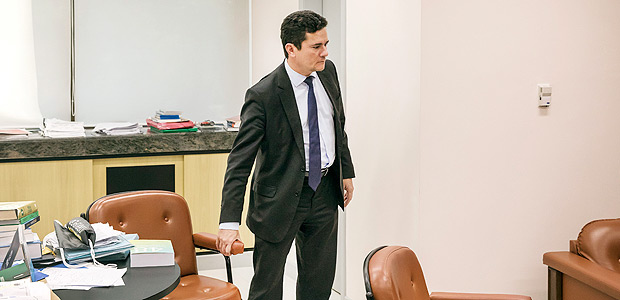Latest Photo Galleries
Brazilian Markets
18h30 Bovespa |
+0,02% | 124.196 |
16h43 Gold |
0,00% | 117 |
09h46 Dollar |
+0,07% | 5,2544 |
16h30 Euro |
+0,49% | 2,65250 |
ADVERTISING
Politicians Aren't Interested in Fighting Corruption, Says Judge Moro
07/31/2017 - 09h08
Advertising
FLÁVIO FERREIRA
SPECIAL ENVOY TO CURITIBA
ESTELITA HASS CARAZZAI
FROM CURITIBA
Federal Judge Sergio Moro, who is overseeing the Lava Jato investigation in the state of Paraná, stated that Brazil's political class needs to take on a harder stance to fight corruption.
"Unfortunately, I've found that there aren't enough Brazilian political authorities who are taking on a more robust stance when it comes to addressing corruption. That causes the impression that confronting corruption is only a task for police, prosecutors and judges", Mr. Moro said.
In an interview with an international journalistic group, which Folha is a member of, Mr. Moro criticized attempts to obstruct investigations.
"We are more concerned with avoiding a return to an earlier era than we are [of] approving bills that could potentially reduce corruption."
Moro also stated that "the law is not an exact science", fending off criticism that he had determined what benefits he would concede to defendants while they were still negotiating their plea-bargain deals.
According to him, "the Public Ministry requested that collaborations be made admissible and that plea-bargains be conceded".
The judge also justified the use of indirect evidence, like the evidence that was used to sentence former president Lula. "It's a part of day-to-day rulings in any criminal court".
According to Moro, the fact that Eduardo Cunha (PMDB-RJ), ex-president of the Lower House of Congress, is in prison shows that the investigations aren't restricted to the Workers Party (PT).
Moro also defended the lifting of secrecy of a telephone conversation intercepted in 2016 between former president Luiz Inácio Lula da Silva and Dilma Rousseff, president at the time.
According to the magistrate, "the people have the right to know regarding the content of their dialogue".
"The choice adopted ever since the beginning of this process has been to make everything public, as long as this wasn't damaging to the investigations. What happened in this case [the wiretaps of Rousseff and Lula da Silva] was nothing different from the rest. An indirect effect of publicizing these cases has been the shielding of the investigations from undue interference."
Translated by THOMAS MATHEWSON AND LLOYD HARDER
Read the article in the original language
| Eduardo Knapp/Folhapress | ||
 |
||
| In an interview with Folha and other media, judge Sergio Moro criticized attempts to obstruct investigations |



